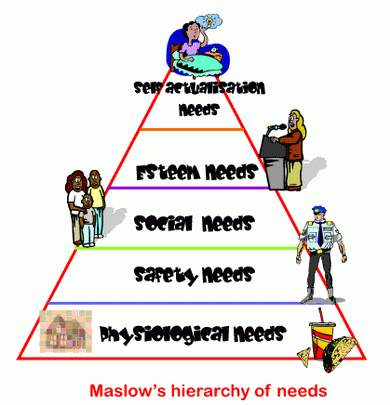Motivation Theories
F.W. Taylor 'Scientific Management'
- People work for personal gain.
- If they are paid more they will work more effectively.
- Break down workers job into simple processes and calculate how much output they should produce in one day.
- If they achieve the target they will be given more money.
Click here to get more information about F.W. Taylor
Maslow’s Hierarchy of needs
Human beings has five types of needs
- Physiological needs or basic needs which relates to food, shelter, warmth and sleep
- Security needs or Safety needs i.e. to protect against danger and poverty
- Social needs is having friendship, a sense of belonging
- Esteem needs involves having status and recognition, achievement and independence
- Self-actualisation involves succeeding to your full potential

Click here to get more information about Maslow's hierarchy of needs
Herzberg’s motivation-hygiene theory
Frederick Herzberg, contributed to human relations and motivation two theories of motivation as follows:
- Hygiene Theory
- Motivation
Herzbergs' first component in his approach to motivation theory involves what are known as the hygiene factors and includes the work and organizational environment. These hygiene factors include:
- The organization
- Its policies and its administration
- The kind of supervision (leadership and management, including perceptions) which people receive while on the job
- Working conditions
- Interpersonal relations
- Salary
- Status
- Job security
These factors do not lead to higher levels of motivation but without them there is dissatisfaction.
The second component in Herzbergs' motivation theory involves what people actually do on the job and should be engineered into the jobs employees do in order to develop intrinsic motivation with the workforce. The motivators are
- Achievement
- Recognition
- Growth / advancement
- Interest in the job
These factors result from internal instincts in employees, yielding motivation rather than movement.
Both these approaches (hygiene and motivation) must be done simultaneously. Treat people as best you can so they have a minimum of dissatisfaction. Use people so they get achievement, recognition for achievement, interest, and responsibility and they can grow and advance in their work.
Therefore, the hygiene and motivation factors can be listed as follows:
Hygiene
- Company policies and administration
- Supervision
- Working conditions and interpersonal relations
- Salary, status and security
Motivators
- Achievement
- Recognition for achievement
- Interest in the task
- Responsibility for enlarged task
- Growth and advancement to higher level tasks
McGregor’s Theory X and Theory Y
Douglas McGregor found out that there are broadly two types of managers. One who believes in Theory X and the other who believes in Theory Y.
theory x ('authoritarian management' style)
- The average person dislikes work and will avoid it he/she can.
- Therefore most people must be forced with the threat of punishment to work towards organisational objectives.
- The average person prefers to be directed; to avoid responsibility; is relatively unambitious, and wants security above all else.
theory y ('participative management' style)
- Effort in work is as natural as work and play.
- People will apply self-control and self-direction in the pursuit of organisational objectives, without external control or the threat of punishment.
- Commitment to objectives is a function of rewards associated with their achievement.
- People usually accept and often seek responsibility.
- The capacity to use a high degree of imagination, ingenuity and creativity in solving organisational problems is widely, not narrowly, distributed in the population.
- In industry the intellectual potential of the average person is only partly utilised.
McClelland's Theory of needs
David McClelland’s research indicates that individuals are motivated based on three needs:
- Need for achievement (NAch): The drive to excel, to achieve in relation to a set of standards, to strive to succeed.
- Need for power (NPower): The need to make others behave in a way that they would not have behaved otherwise.
- Need for affiliation (NAff): The desire for friendly and close interpersonal relationships.
Vroom's Expectancy theory of motivation
Vroom realized that an employee's performance is based on individuals factors such as personality, skills, knowledge, experience and abilities.
The expectancy theory says that individuals have different sets of goals and can be motivated if they believe that:
There is a positive correlation between efforts and performance,
- Favorable performance will result in a desirable reward,
- The reward will satisfy an important need,
- The desire to satisfy the need is strong enough to make the effort worthwhile.
Vroom's Expectancy Theory is based upon the following three beliefs:
- Valence (Valence refers to the emotional orientations people hold with respect to outcomes [rewards]. The depth of the want of an employee for extrinsic [money, promotion, time-off, benefits] or intrinsic [satisfaction] rewards). Management must discover what employees value.
- Expectancy (Employees have different expectations and levels of confidence about what they are capable of doing). Management must discover what resources, training, or supervision employees need.
- Instrumentality (The perception of employees whether they will actually get what they desire even if it has been promised by a manager). Management must ensure that promises of rewards are fulfilled and that employees are aware of that.
Vroom suggests that an employee's beliefs about Expectancy, Instrumentality, and Valence interact psychologically to create a motivational force such that the employee acts in ways that bring pleasure and avoid pain. This force can be 'calculated' via the following formula: Motivation = Valance x Expectancy(Instrumentality). This formula can be used to indicate and predict such things as job satisfaction, one's occupational choice, the likelihood of staying in a job, and the effort one might expend at work.





